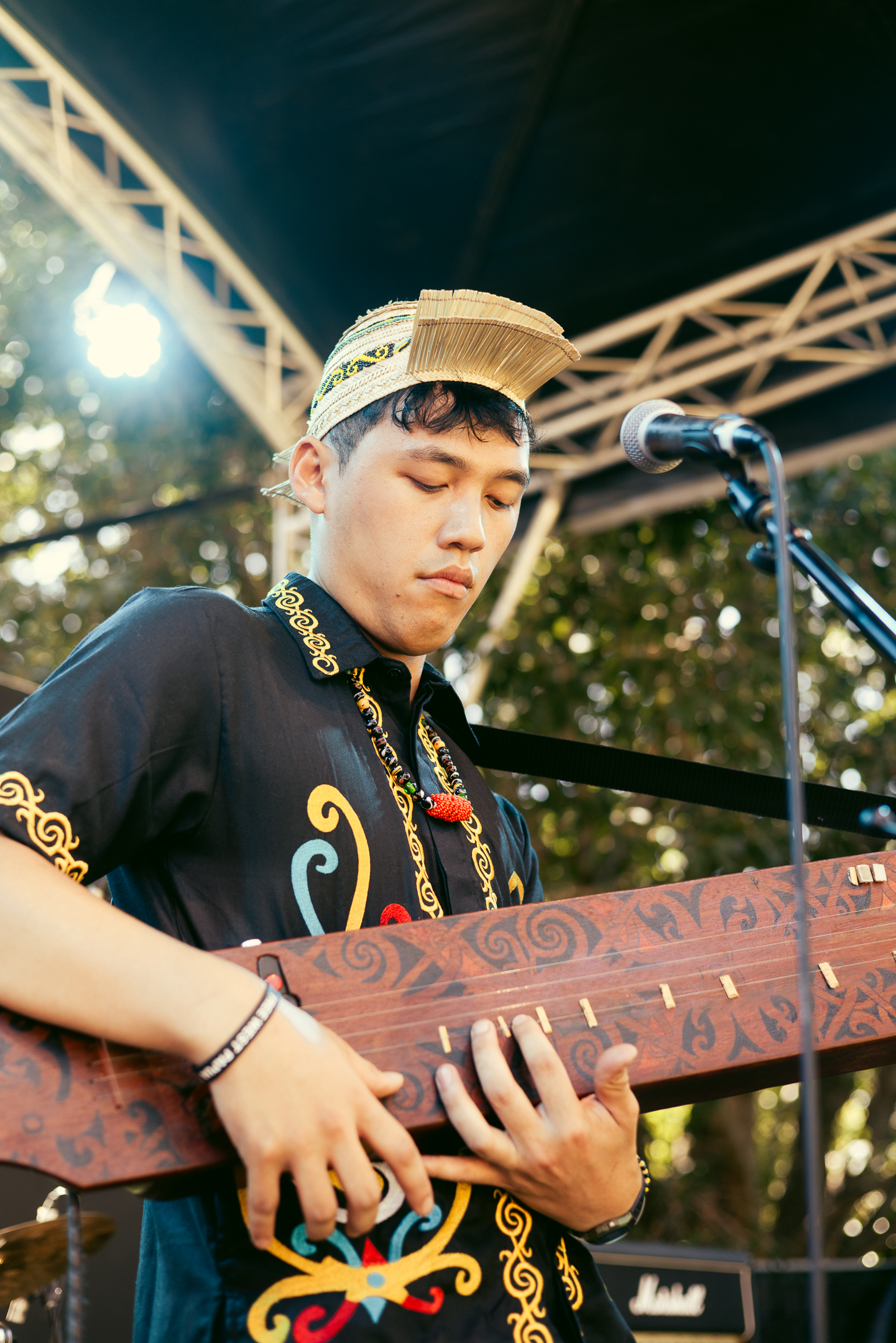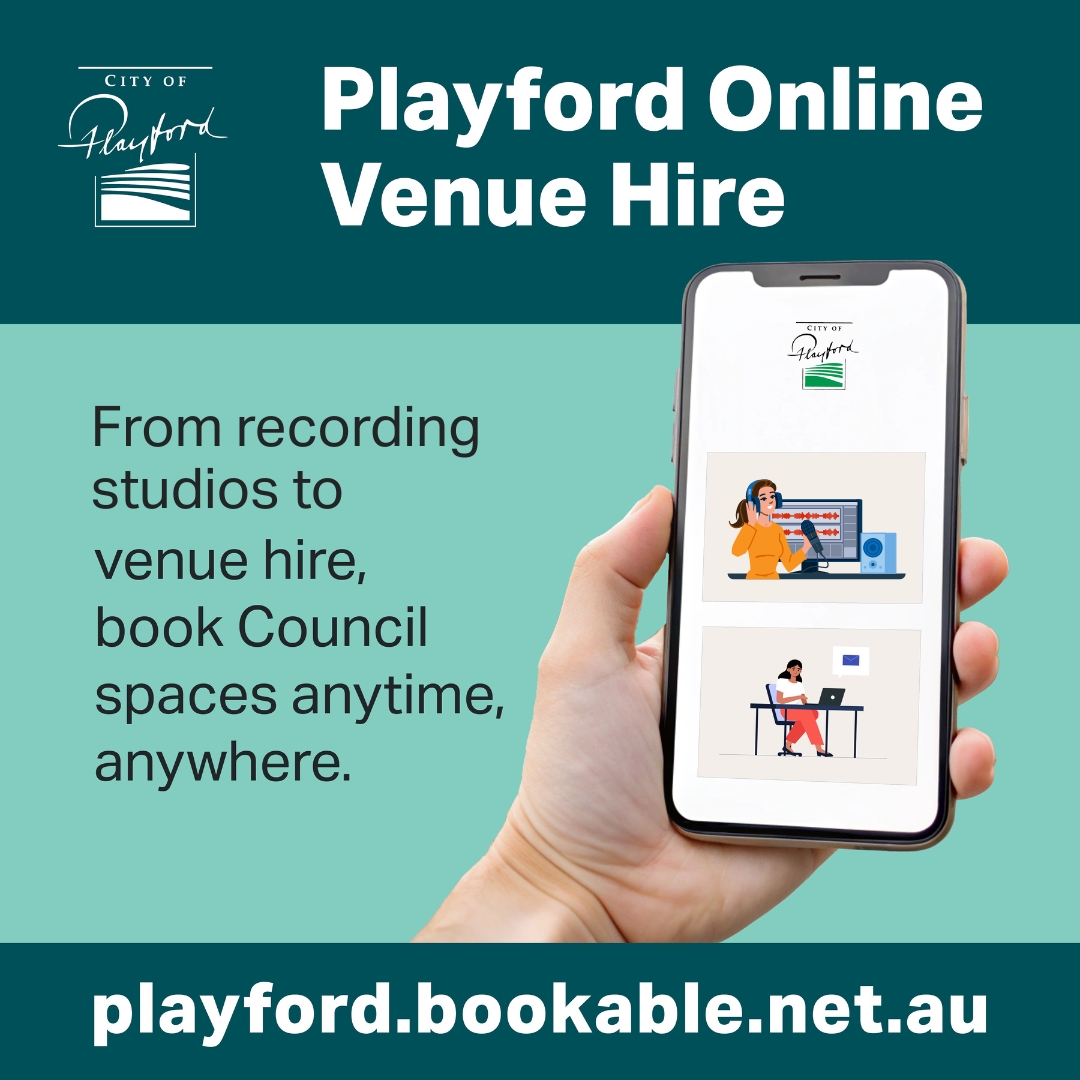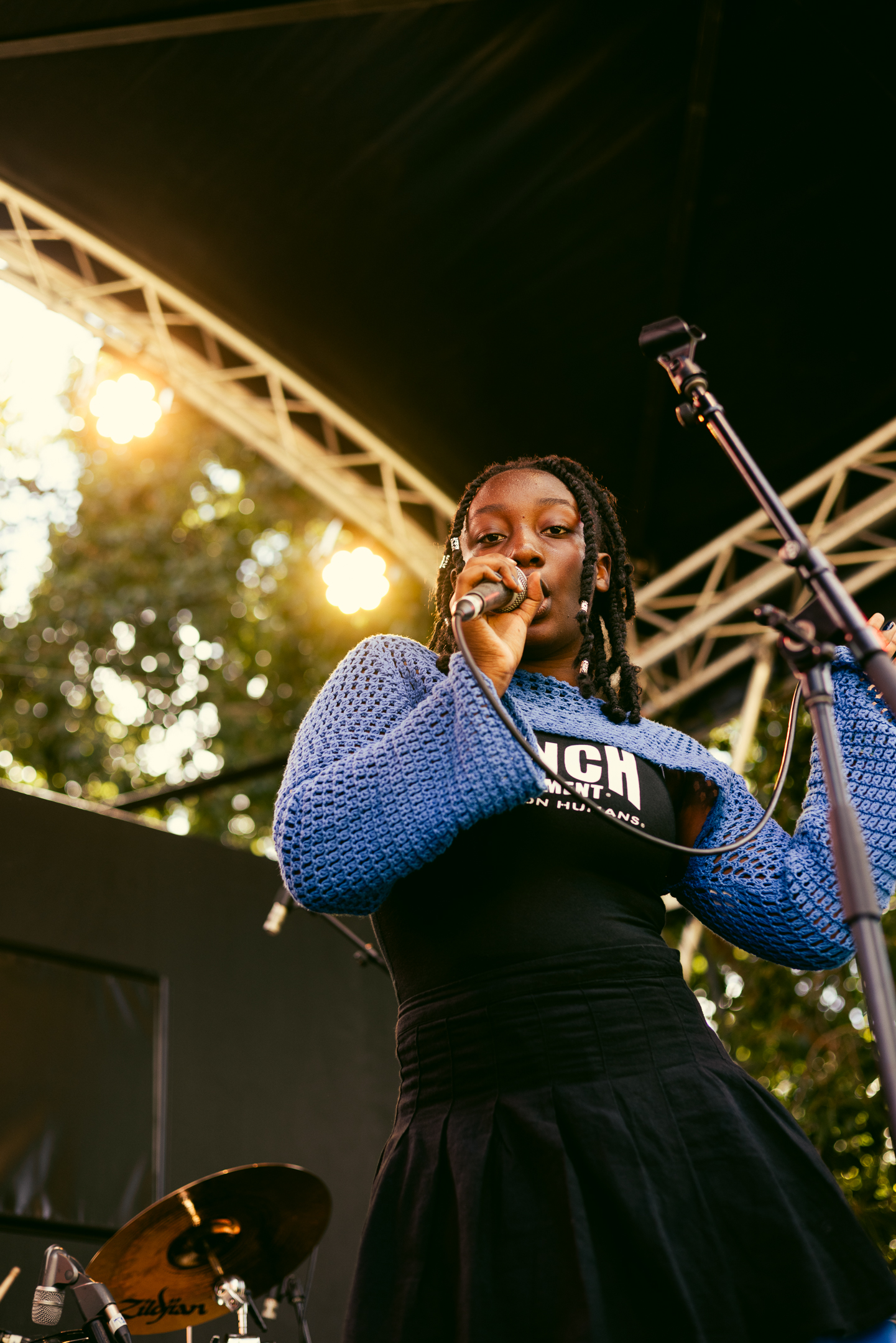Rising Hip-Hop star Tkay Maidza graduated from school at 16 but her debut album bristles with unfinished business.
At first glance, you might think it’s a big car for such a compact driver. But the girl with masses of black hair spilling past the seat of her brown corduroy dungarees owns it in every sense of the term. Besides, actually, she doesn’t much care what you think.
She does a hasty sweep of the passenger seat, dumps the odd takeaway container in the back and hits the ignition. She presses a Doc Marten boot to the accelerator and the red-and-white probationary plate starts jiggling conspicuously from the windscreen.
“I woulda been off my Ps by now,” Tkay Maidza says, “but I got done for speeding. Sixty-five in a 60 zone.” She glances sideways with a hint of injustice as she steers the wide crimson Jeep through the suburban roundabouts of the late afternoon.
“I did all my driving lessons in these streets. Ah, good times,” she chuckles. We pass the tennis club where she played “all through high school” – which actually amounts to just three years of an unsettled childhood bouncing from Zimbabwe via Perth, Kalgoorlie and Whyalla. But it was here in Adelaide that she’d make her mark. The proof is painted on a wall of St Michael’s College, the co-ed Catholic high where she graduated at the tender age of 16, five short years ago. Crimson beast parked, we stroll through iron gates, past the semi-circular façade of the art department, and left into a secluded courtyard dominated by a recently commissioned pop-art portrait of a dark-skinned girl with deep brown eyes.
How does it feel?
“Pretty strange,” she concedes, standing in front of her stylised self, spray-painted in cartoon colours on larger-than-life panels by local street artist Vans the Omega.
“I did a lot of art in my last year of high school,” she says, snooping in windows in the hope of recognising a former teacher. “My goal was to be dux for art. I really wanted to be the top art student. I came second ’cause I was moderated down. So sad! But it was OK. I’m fine with it now.”
Revenge, after all, is a dish best served cold. In a sense, that’s what Tkay is: a debut album on a major international label by a 20-year-old rapper with a sweet smile and a playful middle finger to a world where she never quite belonged. “Yes, I’m a self-made disaster/But there won’t be anyone after/They’ll look up my name/And they will see my reign was/Hard work to experience rapture.”
In classic hip-hop style, there might be a syllable or two of hyperbole in the album’s opening proclamation of all-time supremacy – especially from one who acknowledges with a wink in the following track, “I’m still kinda young”.
In truth, her three-year rise from Triple J’s Unearthed surprise pile to a guest rap from Killer Mike, via a Twitter commercial for Pope Francis (nope, not kidding), has seemed more effortless than ball-breaking. The “self-made” part, though, is pretty much the story of Takudzwa Maidza’s life.
“I moved to Australia in 2001,” she begins, seated now at a café window overlooking the beach she barely visited while growing up in the surrounding streets. “We were in Perth for six or eight months and that was when my parents were flying in and flying out to [Port] Hedland and other [mining] towns up there.
“I’d be staying with family friends because my parents were never home. I was like five, six years old.” Hmm, sounds like a lifelong separation anxiety complex in the making. “Not really,” she smiles. “I think when you’re five you’re just excited to stay with your friends all the time.”
Her parents’ mining boom credentials – she a metallurgist, he an industrial chemist – ensured a life of “constantly moving, ever since I was born”, Maidza says. “Even when we were in Zimbabwe, we were always moving between our home, our grandparents’ home and our aunties’ and uncles’.”
Moves to Kalgoorlie in 2002, then Whyalla in 2005, were unencumbered by strings of any kind. “I wasn’t really attached to anyone, so one day my mum said, ‘Do you wanna move away from Kalgoorlie?’ I was just like, ‘Sure’. It was strange sometimes, because I felt like an outsider for a lot of the time. But I learned to use that as an advantage. When I was misunderstood it was like, ‘Oh, they don’t know me anyway, so whatever.’ I probably had the idea that I was always going to leave soon anyway.”
With hindsight, she traces that attitude of self-reliance to her mother, Jenet. “She encouraged me to focus on what I wanted to do and stay true to myself and not feel bad for not being close to people, ’cause when you move on, people fall off anyway. It wasn’t really a bad thing. Nothing personal,” she says with a slightly wicked chuckle.
Music, however, was more of a blood relation than a fleeting acquaintance. Tkay’s uncles include Andy Brown, the outspoken Harare folk legend who passed in 2012; and Teboho Maidza, no stranger to the art of rap via his ongoing tenure in South African ska outfit the Rudimentals.
Her father, Munya, is also a musician. He taught her guitar for a short while in Whyalla, until young Tkay decided she preferred tennis (“I’m in this alone, these posers think they win but don’t,” she boasts on “Tennies”). School friend Ethan Schmitt remembers her prowess on the court – and also a burgeoning love of R&B kickstarted by Ke$ha’s “Tik Tok”.
“I felt like an outsider,” says Maidza of her childhood. “I learned to use that as an advantage.”
“She was always on top of the newest upcoming artists,” he says. “But as far as recording her own stuff goes, I never had any idea she was into that until she moved to Adelaide and started posting things on YouTube and Facebook. I guess I was surprised, but she was always very artistic; very expressive.”
It was in a house just a stone’s throw from this café that Kanye West’s My Beautiful Dark Twisted Fantasyoffered her a place she could move into and make her own.
“I really liked the song ‘Power’, so that was my first remix,” she says. “I ripped the song off YouTube, just an instrumental, recorded my voice to it and then cut his vocals into random parts. I rewrote the lyrics and restructured the song to suit myself and made a video of me performing it. I put it on YouTube just as a joke.”
The video is long deleted, she says without regret. “I think I was just reinterpreting what he was saying. It was the beginning of me expressing my anger towards friends and whatever, non-friends. It was the first time I’ve ever written anything and record- ed it. I would just talk about cats and dogs and . . . just a teenager being silly. But realising I can rhyme words.”
And fast.
“Yeah. I think that was always there. Busta Rhymes’ ‘Look At Me Now’ [with Chris Brown] came out around that time too, and just the ability to rhyme fast was amusing to everyone so I was like, ‘Oh, this is fun. I wonder how many words I can fit into a sentence?’ My parents would take me to parties and sometimes I’d be entertainment. My dad would be playing the same night as well, and I’d just be playing all these covers. Whenever I rhymed fast it was like, ‘Oh, that’s amazing.’ It wasn’t like they knew what I was saying but they were amused because it was so fast.”
It was two long bus rides north, in the outer working class suburb of Elizabeth, that Maidza began to formalise her hip-hop education. Northern Sound System is a community resource centre where “they teach kids how to write and record pop music”, she explains. “I would just attend. I wouldn’t record anything. I’d just stay back and watch people.”
Project officer Nick O’Connor remembers a slightly more forward newcomer arriving with her mother to sign up to the facility’s artist development program. “She was always super confident, as a person and as a vocalist,” he says, “really free-flowing with her lyric writing process.” One day she laid down a couple of verses in the recording studio and “it was killer”, he recalls with a laugh. “A bit more killer than average.”
He started sending her raw rhymes to a local producer, Bad Cop, and the tracks that came back – “Handle My Ego” and “Brontosaurus” – surprised nobody more than the rapper herself.
“I was confused because I didn’t really understand dubstep,” Maidza says. “I just liked pop and R&B music so… it might have been just a little bit too strange for me. But I had all these people encouraging me to upload it to Unearthed, so…”
A few spins on Triple J’s breakfast show had the phones ringing and DJs, booking agents, managers and record labels suddenly circling a 16-year-old tennis enthusiast from nobody-quite-knew-where. “That was straight after I finished high school,” she recalls.
“My dad knew what Triple J was and he thought it was really amazing because I think he’d been uploading songs to Unearthed himself. I told my mum I was going to take a gap year and that I wanted to be a musician and she said, ‘What? How?’ I didn’t really have a plan so she said, ‘Well, you better go to university.'”
As it happened, the architecture degree at Adelaide Uni didn’t occupy too much of her time. In 2013, she made a splash at the Bigsound music biz gathering in Brisbane, signed to Universal Music under the Dew Process umbrella, and even jumped the commercial radio divide with a debut EP, Switch Tape. Tracks like “Switch Lanes” and “M.O.B.” (“money over bitches”) crackled with the personality of a lifelong outsider who, well, kinda liked it that way. “I don’t know why they think we’re alike,” she sings in the former. “I don’t know why they think we’re the same. They link it up but I know I’ll switch lanes.”
The air of the staunchly self-determined lone traveller is thicker still on the Tkay album. Its recording was a protracted process spanning Adelaide to Los Angeles, another change of landscape she took in her stride – but this time without the perennial assurance of the family home.
“Sometimes I felt really lonely, but the more I went there the more I realised what being an adult was,” she says. “It was great to have that independence and the confidence to think, ‘OK. I need to travel from Venice Beach to Hollywood and it’s midnight after a session’, but it was fine.”
The grown-up world may have been dawning on the horizon, but as far as her writing was concerned, there was plenty of unfinished business in the rearview mirror.
“It’s sort of meant to be a day in the life of a schoolgirl,” she says of the album’s narrative, which comprises an ongoing conversation with some undefined schoolyard hassle she can’t wait to leave behind, a firm and not always polite kiss-off to some perceived nemesis. “Doubters, opposition,” she elaborates with a wave of her hand. “People who are trying to prove that they can do something better than me. It might not even be people. It might be, like, a group of things in my head that are trying to tell me what I can’t do. It’s the other little evil Tkay telling me, ‘No, that’s not right.'” She laughs at the image laid bare.
Hardly the hip-hop hell-raiser, she recalls her years at St Michael’s as focused primarily on academic achievement and tennis, obsessions she used to cocoon herself from the adolescent politics of the schoolyard.
“I find it weirdly hard to socialise with people my own age,” she shrugs. “I can communicate with people older than me a lot better. I don’t know why.”
Maybe the simple fact of being a slightly more worldly stranger in the belly of the insular white Aussie middleclass played some part in that?
“I remember I definitely did have kids bullying me,” she concedes. “There were days when I’d get chased all the way home, but as soon as I was home I’d just forget about it and I didn’t tell my parents anything. It just felt normal for me to forget about it and move onto something else. I think I just focused on other positives.”
Hey, no artist ever went far without something to kick against. “Yeah, ’cause it pushes you to do better. For me it does. Especially playing sport, you always have to beat someone. Even if it’s only yourself.
“When I finished the album,” she grins, “I had lots of people saying, ‘Wow, this is really great’, but there’s always something in the back of my head saying, ‘They’re lying.’ I’ll always think someone hates me even if lots of people like me.” She laughs like she really, honestly couldn’t care less.
Before we say goodbye to the old neighbourhood, there’s one last stop Maidza wants to make. We drive a couple of kilometres north, and pull up at a two-storey house opposite a vacant lot just inside the sand dunes.
This is the first house she lived in when her family arrived from Whyalla. The one where she recorded her own voice on that Kanye West track. The first rap of the rest of her life. For a more sentimental person, it might be a moment to savour. But we’re back in the Jeep within a minute.
“My ultimate,” she says, “would be to be like Rihanna and to live somewhere on an island where no one can find me and I can just make songs and I don’t have to show anyone and I’m just happy. Just to have that freedom and not have to worry about what people think of you but to be doing what you want to do at the same time…I’d like that. To be able to work with the best people and everyone’s like, ‘She can do whatever she wants ’cause she’s Tkay.'”
An oncoming car momentarily blocks our way. “You know what?” she says to nobody in particular, then bounces the Jeep up, over the curb, across the traffic island and down the other side into a more accommodating lane. The P plate sways helplessly on the windscreen.



